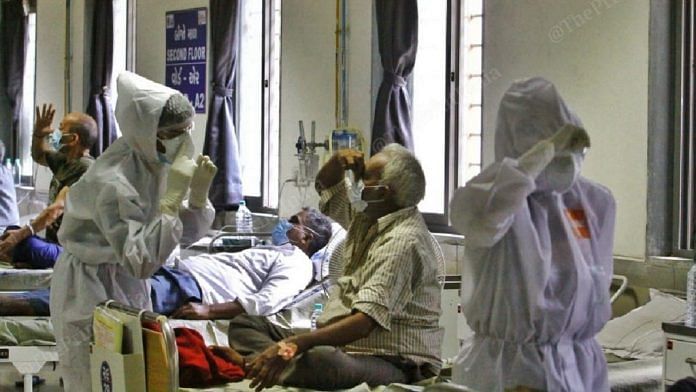New Delhi: India could witness a steep fall in the Covid-19 cases by 1 July but a third wave is likely to hit the country in the next six to eight months, according to the government-appointed National Covid-19 Supermodel Committee, which makes projections on the likely spread of the pandemic.
Prof M. Vidyasagar of IIT Hyderabad, who heads the three-member committee, told ThePrint cases could drop to about 15,000 a day by 1 July.
“By the end of May, India will see about 1.5 lakh cases per day and by the end of June, the country will witness 20,000 cases on a daily basis,” he said.
He, however, warned that a third wave of the pandemic could hit the country after about six to eight months.
According to the scientist, the panel — also comprising Prof Manindra Agrawal of IIT Kanpur and Lt Gen Madhuri Kanitkar, deputy chief of the Army Medical Service — has made these projections based on the SUTRA model.
SUTRA stands for Susceptible, Undetected, Tested (positive) and Removed Approach.
“If you will check the SUTRA model, you will see that we project nationwide cases reducing to around 15,000 by 1 July,” Prof Vidyasagar said. “That can be thought of as the end of the second wave.”
He, however, said the findings have not yet been shared with the central government as the panel has not met officially in the past six months. The committee helps the central government to make projections about the spatial and temporal spread of the pandemic.
The scientist also clarified that the study was not sponsored by the central government. “Government authorities have not yet asked us for our inputs on the third wave,” he said.
Also read: India’s first home kit for Covid test to hit stores next week. Here is how you can use it
‘Third wave likely in 6-8 months’
Prof Vidyasagar told ThePrint that in predicting the time-frame for the third wave, the panel has relied on research from Italy, which has shown that Covid-19 antibodies (in Italian patients) last in the body for six to eight months.
He added that they have assumed immunity in Indians who have been exposed to Covid-19 may erode in the next six to eight months.
“This (Italian study) was a small study with just 162 patients, but it is indicative,” he said. “So we can expect that the current group of Indians who have been exposed to Covid (both the detected and undetected) will retain their immunities until between November and January,” he said.
The scientist added that the next wave may not have the impact of the second wave, if the pace of vaccination drive increases.
“By then we need to vaccinate a sufficient number of people to prevent a significant rise in cases, and to turn the potential third wave into a third bump,” he said.
Prof Vidyasagar said the extent of damage in a possible third wave will depend on the rate of vaccination.
“The height of the peak will depend entirely on the number of vaccinations we are able to administer,” he said. “If we can vaccinate at least half of the adult population with at least one dose (60 crore dose), it would reduce the peak somewhat.”
‘By end of second wave, India may register another 30 lakh cases’
Explaining the findings of the SUTRA model, Prof Vidyasagar said India had tested 1 crore positive patients at the peak of the first wave, and added another 10 lakh in the decreasing phase.
“In the second wave (which has obviously peaked by now), between 1 March (start of the second wave) and 8 May (peak of the second wave), we had 1.2 crore new patients,” he said.
Going by analogy, he said, India might see another 30 lakh cases by the end, making it around 1.5 crore cases during the second wave.
“So the total number of cases is not all that much different from the first wave,” he said. “However, since these cases were packed into a much shorter timeframe, the load on the healthcare system was much higher.”
(Edited by Arun Prashanth)
Also read: Prepare for third wave, keep stocks of key Covid drugs ready, Modi govt tells pharma firms



